The AMD 2nd Gen Ryzen Deep Dive: The 2700X, 2700, 2600X, and 2600 Tested
by Ian Cutress on April 19, 2018 9:00 AM ESTCPU Office Tests
The office programs we use for benchmarking aren't specific programs per-se, but industry standard tests that hold weight with professionals. The goal of these tests is to use an array of software and techniques that a typical office user might encounter, such as video conferencing, document editing, architectural modelling, and so on and so forth.
All of our benchmark results can also be found in our benchmark engine, Bench.
Chromium Compile (v56)
Our new compilation test uses Windows 10 Pro, VS Community 2015.3 with the Win10 SDK to combile a nightly build of Chromium. We've fixed the test for a build in late March 2017, and we run a fresh full compile in our test. Compilation is the typical example given of a variable threaded workload - some of the compile and linking is linear, whereas other parts are multithreaded.
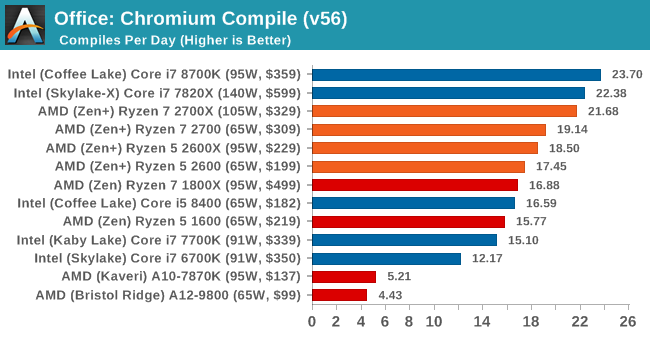
Having redone our compile testing, we can see that the new Ryzen-2000 series parts do provide a good uplift over the first generation, likely due to the decreased cache latencies and better precision boost. Performance per dollar between the 8700K and the 2700X would seem to be about equal as well.
PCMark8: link
Despite originally coming out in 2008/2009, Futuremark has maintained PCMark8 to remain relevant in 2017. On the scale of complicated tasks, PCMark focuses more on the low-to-mid range of professional workloads, making it a good indicator for what people consider 'office' work. We run the benchmark from the commandline in 'conventional' mode, meaning C++ over OpenCL, to remove the graphics card from the equation and focus purely on the CPU. PCMark8 offers Home, Work and Creative workloads, with some software tests shared and others unique to each benchmark set.
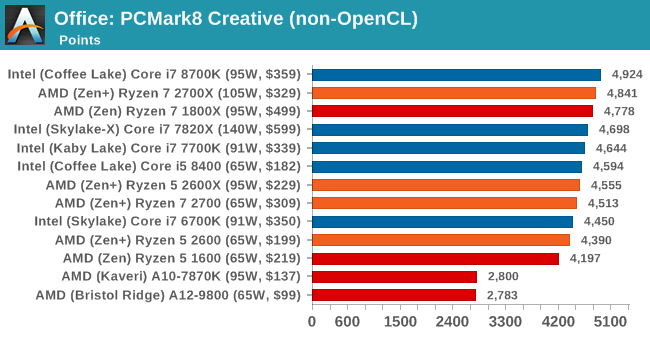
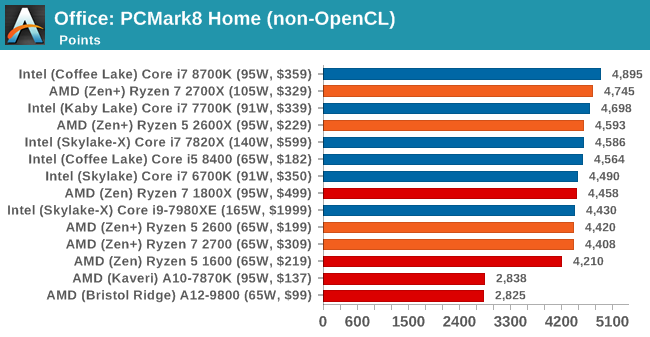

PCMark 10
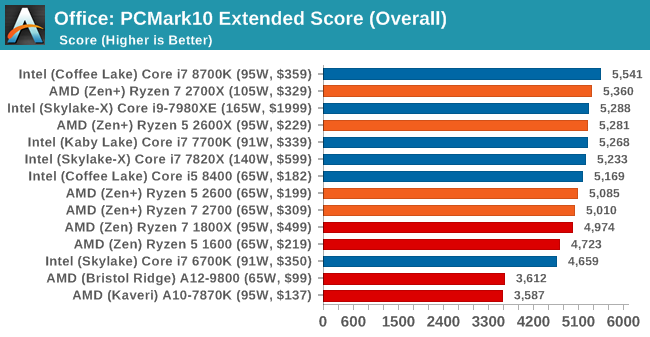
GeekBench4
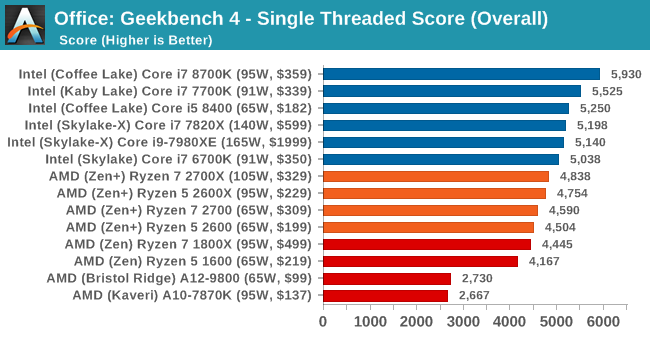
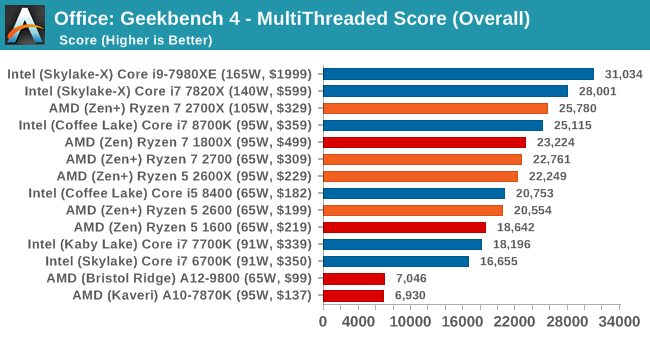
If you live and breathe GeekBench 4, then the single threaded results put Intel firmly in first place. For the multi-threaded tests, the top Intel and AMD mainstream parts are going at it almost neck-and-neck, however it is clear that the previous generation quad-cores are falling behind.










545 Comments
View All Comments
Santoval - Thursday, April 19, 2018 - link
It's possible that the first consumer Intel 8-core will be based on Ice Lake. Cannon Lake will probably largely limited to low power CPUs, and will probably top out at 4 cores. Of course if Ice Lake is delayed again Intel might scale out Cannon Lake to more cores. Cannon Lake will be just a 10nm node of the Skylake/Kaby/Coffee Lake architecture, so it will most likely provide mostly power efficiency gains.aliquis - Thursday, April 19, 2018 - link
Latest road map show coffee lake refresh in Q4.mahoney87 - Thursday, April 19, 2018 - link
lol :Dhttps://imgur.com/SmJBKkf
They done fecked up
Luckz - Monday, April 23, 2018 - link
Rocket League is a joke game when it comes to benchmarking, optimization and so on.Chris113q - Thursday, April 19, 2018 - link
Do you really need to be spoon-fed information? How long would it take you to find the other reviews by yourself?PCPER, Tweaktown, Toms Hardware, Hothardware, Computerbase all had different results (can't post link due to spam protection). Not to mention you'd have to be totally tech illiterate to believe that stock 2600 can beat 8700k by such a huge margin. Meltdown/Spectre patches don't affect gaming performance that much, so don't you put blame on that.
The result discrepancy is embarrassing, there goes the last speck of reputation Anandtech had as a reliable source of tech news.
MuhOo - Thursday, April 19, 2018 - link
You sir are right.Aegan23 - Thursday, April 19, 2018 - link
You do know who Ian is, right? XDsor - Thursday, April 19, 2018 - link
Anandtech has no responsibility to go out and ensure their results match up with anyone else’s. They run their own selection of tests with their own build and report the numbers. They provide the test setup, if you can’t spot the differences that’s your own issue.Ryan Smith - Thursday, April 19, 2018 - link
"Anandtech has no responsibility to go out and ensure their results match up with anyone else’s"Responsibility? No. But should we anyhow? Yes.
Our responsibility is accuracy. If something looks weird with our data - which it does right now - then it's our job to go back, validate, and explain the results that we're seeing. If our results disagree with other sites, then that is definitely an indication that we may have a data issue.
xidex2 - Thursday, April 19, 2018 - link
I bet none of the other sites applied spectre and meltdown patches for Intel because they dont care about such things. Intel fanboys are now crying because someone actually showed true numbers.